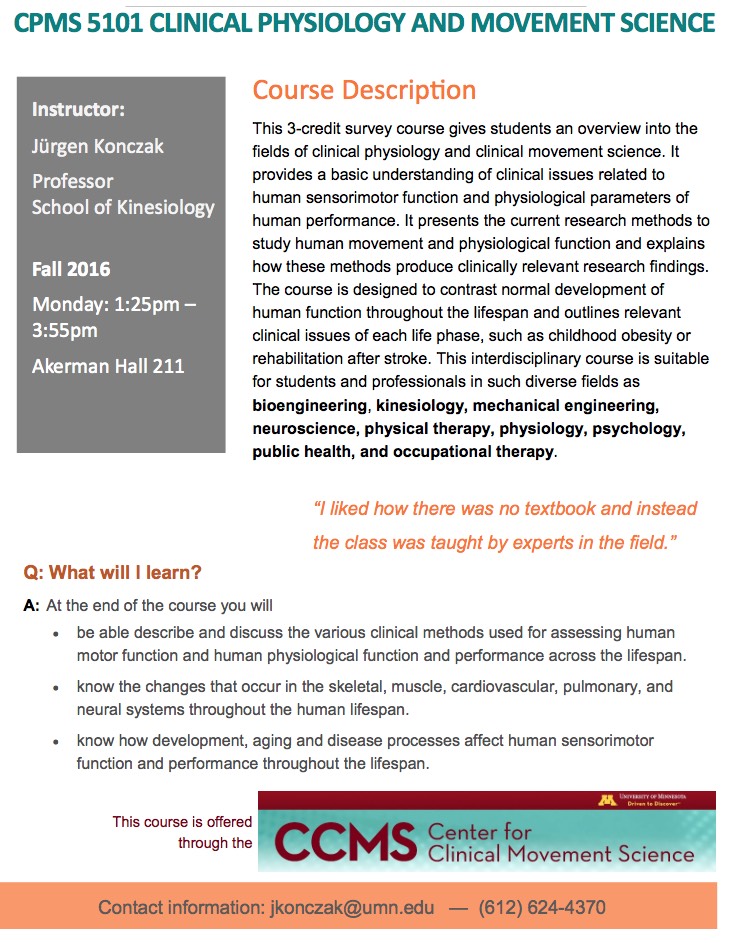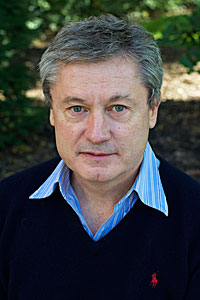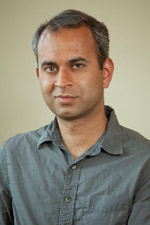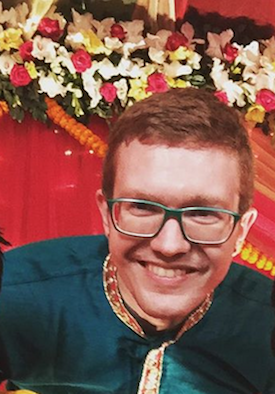

HSEM 3 720 Conflict, Anger, Aggression and Violence (3 credits)
Instructor: Michael Potegal, Associate Professor, Occupational Therapy Program
When: Tues, Thurs 1:00 - 2:15 pm
Where: To be announced ...
Bullying, school shootings, war and genocide are examples of aggression that cause misery, trauma and death on progressively larger scales. Why do people behave aggressively? Is aggression in our "animal natures", our genes, or our brains? Is it the result of our upbringing, our cultures, or our physical, social or economic environments? Is aggression inevitable or are there things we can do to limit, avoid, or prevent it? This seminar will help students formulate their own answers to these important questions by reviewing areas of research on conflict, aggression, anger and violence in humans and other animals. The first section of the seminar will guide students to an understanding of current views of its biological bases: aggression as an evolutionary adaptation and as a reproductive strategy, and its corresponding genetic, neural and hormonal foundations. The middle section of the seminar will focus on aggression at the level of individuals. This includes behavioral expression (e.g., anger, direct vs. indirect forms of aggression); development (e.g., tantrums, bullying); motivation for and learning to be aggressive; and aggression-prone personality, psychopathology and criminality. The last section of the seminar will deal with aggression in small and large social groups (e.g., gang violence, warfare and genocide.) In the final session, we will review solutions to the problems of aggression: prosocial and affiliative processes such as reconciliation, peacemaking, and programs for the prevention or mitigation of violence.
Students who are not in the Undergraduate Honors program may register for the course at honors@umn.edu
KIN 5941 - Clinical Movement Neuroscience (3 credits)
Instructor: Jürgen Konczak, Professor
School of Kinesiology
When:
Tuesdays, 2:30 - 5:00 pm
Where: To be announced ...
This course provides an overview of various neural subsystems involved in controlling human motor behavior with a special emphasis on understanding how various neurological disease states affect motor function. The effects of specific brain lesions and nervous system diseases on overt behavior will serve as a guide to assess the role of different neural structures for movement control. The overall aim of the course is to gain a better understanding of how a specific dysfunction at the neural level leads to specific impairments in behavioral or sensorimotor function. In addition, the course will review how current pharmacological, behavioral and technology-driven treatments help to alleviate sensorimotor symptoms and improve function.
 CPMS 5101 Clinical Physiology and Movement Science (3 credits)
CPMS 5101 Clinical Physiology and Movement Science (3 credits)
Instructor: Jürgen Konczak, Professor
School of Kinesiology
When:
Mondays, 1:25 - 3:55 pm
Where: Akerman Hall 211
This 3-credit survey course gives students an overview into the fields of clinical physiology and clinical movement science. It provides a basic understanding of clinical issues related to human sensorimotor function and physiological parameters of human performance. It presents the current research methods to study human movement and physiological function and explains how these methods produce clinically relevant research findings. The course is designed to contrast normal development of human function throughout the lifespan and outlines relevant clinical issues of each life phase, such as childhood obesity or rehabilitation after stroke. This interdisciplinary course is suitable for students and professionals in such diverse fields as bioengineering, kinesiology, mechanical engineering, neuroscience, physical therapy, physiology, psychology, public health, and occupational therapy.
 CSOM 8810 Special Topics — Human Motivation (2 credits; A term)
CSOM 8810 Special Topics — Human Motivation (2 credits; A term)
Instructor: Kathleen Vohs, Professor, Marketing Department
When: Tuesday Sept 6 to Tues Oct 18, 2016, 2-5pm
Where: Carlson School of Management, Room 3-166
How can scientists understand people's thoughts, feelings, and behaviors without knowing what motivates those outcomes? This will be a crash-course in motivation models. The course will be a survey of classic and new papers in the area of motivation, spanning psychology, consumer behavior, organizational psychology, and health. As a Ph.D. seminar course, you will be an active participant in it at every step. Each week we will discuss a handful of articles in-depth. You are expected to read the articles carefully, noting their contributions, methods, and possible drawbacks. You should know what the authors did and found, understand their theory, and evaluate the aforementioned in terms of plusses and minuses. At the end, you will better be able to develop and critique research ideas than you could at the start.
 CPSY 8101 Graduate Fellowship Proposal Writing Seminar (1 credit)
CPSY 8101 Graduate Fellowship Proposal Writing Seminar (1 credit)
Instructor: Megan Gunnar, Director, Institute of Child Development
When: Mondays and Wednesdays, 4:00 -5:30 pm
Where: To be announced ...
The primary purpose of this course is to prepare students to submit a competitive NSF Graduate Research Fellowship. Students submitting to other organizations are welcome to join the course, but they should be aware that all of the assignments and the focus will be on increasing NSF predoctoral fellowship competitiveness.
Increasing competitiveness involves both direct instruction and small group work. The course is set up to meet twice a week with portions of each meeting set aside for group work.
During the lecture and large group discussions we will cover:
1) a variety of approaches to proposal writing,
2) the importance of knowing the audience for whom you are writing,
3) the proposal review process,
4) strategies for completing the sections of the NSF GRF proposal,
5) NSF's "Broader Impacts" criterion and how to address these and
6) time management.
Reading, critiquing, and revising your proposal will increase its competitiveness. You will be assigned to a group of 3-4 students who will be your study group. Whenever possible, your group will include students with different research orientations. This will mirror your chance that readers outside your area may get assigned to your proposal at NSF.
You are also STRONGLY encouraged to have people from your research labs reading your proposals, along with working closely with your advisor.
NSF proposals for psychology, social sciences and STEM education areas are due Thursday, Oct 27th. Thus the course will meet from Sept 7th to Oct 26th, Monday and Weds from 4pm to 5:30pm. The extended times will allow you to meet with your study group during class time.

PHYS 4041 Computational Methods in the Physical Sciences
Instructor: Jorge Vinals, School of Physics and Astronomy
When: Mondays, Tuesdays, Wednesdays and Fridays, 8:00 am
Where: Physics & Nanotechnology 120
This class is an introduction to Scientific Computing from the point of view of scientific applications. It is not a programming class, although some programming experience is assumed and will be necessary during the class. This class is not about learning to use algorithms written by others either, although some reuse, especially of general purpose libraries, will be essential. Rather, the class will focus on the understanding and design of a computing strategy to solve science problems, the basic numerical analysis that is necessary to develop classes of algorithms, and the implementation of simple but custom application codes.

EPSY 8114: Seminar: Advanced Cognitive Psychology
Instructor: Sashank Varma, Educational Psychology
When: Tuesdays, 2:30 - 5:15 PM
Where:
Peik Hall 155
This course is a graduate introduction to cognitive psychology. It is "advanced" in the sense that it focuses on higher-level cognition, and also in its emphasis on theories and models in addition to empirical results. The topics include the cognitive revolution, working memory, executive function and cognitive control, long-term memory, learning and transfer, concepts and categorization, expertise, problem solving, reasoning, language comprehension, mathematical thinking, and cognitive architecture.
Graduate students interested in cognitive psychology are invited to register for the course, regardless of disciplinary background.
For questions or more information, please contact Dr. Sashank Varma (sashank@umn.edu).
 EE 8591 Predictive Learning From Data (3 credits)
EE 8591 Predictive Learning From Data (3 credits)
Instructor: Vladimir Cherkassky, Electrical and Computer Engineering
When: Mondays & Wednesday, 2:30 - 3:45 pm
Where: Keller Hall 3-125
Methods for estimating dependencies from data have been traditionally explored in such diverse fields as: Statistics (multivariate regression and classification), Engineering (pattern recognition, system identification), Computer Science (artificial intelligence, machine learning, data mining) and Health Informatics. Recent interest in learning methods, triggered by the widespread use of digital technology, has resulted in the development of biologically motivated methodologies, such as (artificial) neural networks, fuzzy systems and genetic programming. Unfortunately, developments in each field are seldom related to other fields. Most real-life applications attempt to estimate predictive data-analytic models that are used for prediction or decision making with new data. This course will first provide a general conceptual framework for learning predictive models from data, and then discuss various methods developed in statistics, pattern recognition and machine learning. Course descriptions will emphasize methodological aspects of machine learning, rather than development of 'new' algorithms.
 LING 5900 Topics in Linguistics - Universal Grammar Alternatives
LING 5900 Topics in Linguistics - Universal Grammar Alternatives
Instructor: Dustin A. Chacón, Institute of Linguistics
When: Mondays & Wednesdays 9:45 - 11:00 am
Where: Elliott Hall S225
Proponents of the Universal Grammar hypothesis argue that there are properties of language that are that are impossible to learn given a typical language-learning environment and that are distinct from other aspects of cognition. For this reason, they argue that there must be an innately prespecified language module. Although this perspective is widely assumed in syntactic theory, alternative frameworks have challenged this approach to language, often highlighting the social use of language, the informativity of the learner's input, and properties of the processing systems. In this class, we will compare and evaluate Universal Grammar-based approaches to a set of foundational phenomena with its alternatives. The goal will be to encourage students to examine how traditional syntactic theory is in dialog with broader questions in language science and cognitive science. Topics include binding phenomena, island phenomena, abstraction in morphology, linguistic universals, and the nature of typological variation. The readings for this class will draw on traditional syntactic theory, language acquisition, psycholinguistics, and usage-based theories.